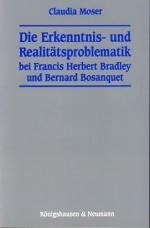|
This section contains 9,390 words (approx. 32 pages at 300 words per page) |

|
Dictionary of Literary Biography on F. H. Bradley
F. H. Bradley was regarded by many of his contemporaries as the only great philosopher England had produced since David Hume. Despite his reputation as the most original, acute, and theoretically vigorous of the British idealists, however, his philosophical influence barely survived his death. He was attacked by his fellow idealists both in Britain and the United States: although Bernard Bosanquet described Bradley's Appearance and Reality: A Metaphysical Essay (1893) as "a gospel among all modern philosophical books," he criticized Bradley's denial of an ultimate coincidence between thought and reality and of the constructive function of contradiction; J. M. E. McTaggart claimed that Bradley failed to attach sufficient metaphysical value to the finite self; G. F. Stout criticized his theory of relations and his characterization of the category of appearance; and Josiah Royce objected that Bradley's definition of the infinite depended too heavily on traditional philosophy. The most devastating...
|
This section contains 9,390 words (approx. 32 pages at 300 words per page) |

|


